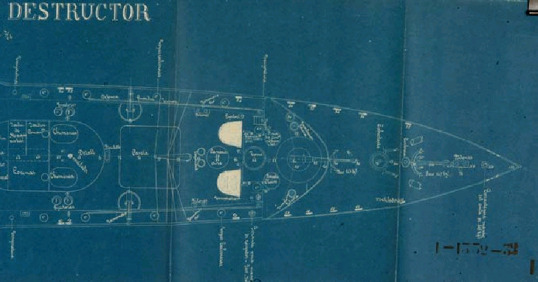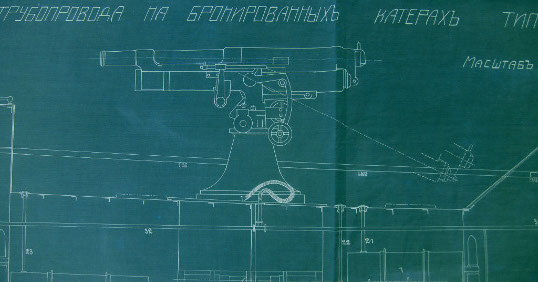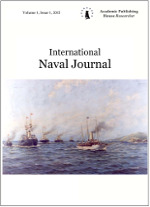2 June 01, 2016
Commentary
1. Antonio G. Erce Lizarraga
To the article «Sail-ship "Juan Sebastían de Elcano"»
International Naval Journal, 2016, Vol.(10), Is. 2, pp. 58-60.
Number of views: 2072 Download in PDF
International Naval Journal, 2016, Vol.(10), Is. 2, pp. 58-60.
Number of views: 2072 Download in PDF
Articles and Statements
2. Yuri F. Katorin
Floating Bombs
International Naval Journal, 2016, Vol.(10), Is. 2, pp. 61-67.
Number of views: 2814 Download in PDF
3. Nicholas W. MitiukovInternational Naval Journal, 2016, Vol.(10), Is. 2, pp. 61-67.
Abstract:
In this article one of the episodes of the siege of Antwerp is described, by duke of Parma in 1585–1586 the years during the Dutch fighting for independence (1568–1648) – of application by those pre-cipitated of fire ships for the purpose of the destruction of the pontoon bridge, which partitioned Shelda river and which made impossible the supply of garrison and population of city, is given the description of the device of fire ships, and also damage substituted by them to Spaniards, is analyzed the influence of this event on the outcome оf Gravelin battle, occurred 8 August 1588 of year.
In this article one of the episodes of the siege of Antwerp is described, by duke of Parma in 1585–1586 the years during the Dutch fighting for independence (1568–1648) – of application by those pre-cipitated of fire ships for the purpose of the destruction of the pontoon bridge, which partitioned Shelda river and which made impossible the supply of garrison and population of city, is given the description of the device of fire ships, and also damage substituted by them to Spaniards, is analyzed the influence of this event on the outcome оf Gravelin battle, occurred 8 August 1588 of year.
Number of views: 2814 Download in PDF
«Competitor’s» Incident
International Naval Journal, 2016, Vol.(10), Is. 2, pp. 68-73.
Number of views: 2101 Download in PDF
4. Lesya L. Goncharenko, Tatyana S. AltyntsevayaInternational Naval Journal, 2016, Vol.(10), Is. 2, pp. 68-73.
Abstract:
On the basis of the American, Spanish and Cuban materials there was a reconstruction the incident with the schooner «Competitor», and possible harmonization of contradictions sources. It is shown that indecision of gunboats «Mensajera’s» command given the opportunity to hold a greater number of smugglers. A hesitant Spanish politicians – to pressure on the part of the US tri-al. All this eventually led to the victory of anti-Spanish forces in the United States.
On the basis of the American, Spanish and Cuban materials there was a reconstruction the incident with the schooner «Competitor», and possible harmonization of contradictions sources. It is shown that indecision of gunboats «Mensajera’s» command given the opportunity to hold a greater number of smugglers. A hesitant Spanish politicians – to pressure on the part of the US tri-al. All this eventually led to the victory of anti-Spanish forces in the United States.
Number of views: 2101 Download in PDF
Alfred Von Tirpitz and Construction of the Navy in the German Empire in 1865–1916
International Naval Journal, 2016, Vol.(10), Is. 2, pp. 74-82.
Number of views: 2093 Download in PDF
5. Roman V. LapshinInternational Naval Journal, 2016, Vol.(10), Is. 2, pp. 74-82.
Abstract:
This article deals with the main activities of A. von Tirpitz in the Imperial German Navy re-lated to its technical re-equipment, the development of the new line of battle and the principles of the squadron organization. As part of implementation of the German Empire colonial policy the admiral founded the imperial outpost, a naval defense base in Qingdao, in the south-east Asia. Much attention is given to the role of A. von Tirpitz in the adoption by Reichstag of naval bills that later became the legislative framework for the modern navy with new ships – dreadnoughts as the basic force. Due to this Germany became equal in naval weapons with England.
This article deals with the main activities of A. von Tirpitz in the Imperial German Navy re-lated to its technical re-equipment, the development of the new line of battle and the principles of the squadron organization. As part of implementation of the German Empire colonial policy the admiral founded the imperial outpost, a naval defense base in Qingdao, in the south-east Asia. Much attention is given to the role of A. von Tirpitz in the adoption by Reichstag of naval bills that later became the legislative framework for the modern navy with new ships – dreadnoughts as the basic force. Due to this Germany became equal in naval weapons with England.
Number of views: 2093 Download in PDF
Finnish Ladoga Flotilla on «Winter» War (November 1939 – March 1940)
International Naval Journal, 2016, Vol.(10), Is. 2, pp. 83-114.
Number of views: 2101 Download in PDF
6. Alexander F. MitrofanovInternational Naval Journal, 2016, Vol.(10), Is. 2, pp. 83-114.
Abstract:
About the formation and the operations of the Soviet Ladoga Flotilla during the so-called «winter» Soviet-Finnish war of 1939–1940 years in the national publications was told repeatedly. About the actions of the enemy – the Finnish Navy on the lake is known less to the same publication, along with a number of errors in structure and size of the force, did not cover their participation in hostilities, the causes and the actual amount of losses and the effect of the Finnish fleet on the course of the fighting on the lake. If you rely solely on these publications, it seems as if due to winter freeze-up and early-war Finnish ships did not take a serious part in the events and had no impact on the course of the fight - but this is not so. As events unfolded and what they brought, and told in the proposed publication.
About the formation and the operations of the Soviet Ladoga Flotilla during the so-called «winter» Soviet-Finnish war of 1939–1940 years in the national publications was told repeatedly. About the actions of the enemy – the Finnish Navy on the lake is known less to the same publication, along with a number of errors in structure and size of the force, did not cover their participation in hostilities, the causes and the actual amount of losses and the effect of the Finnish fleet on the course of the fighting on the lake. If you rely solely on these publications, it seems as if due to winter freeze-up and early-war Finnish ships did not take a serious part in the events and had no impact on the course of the fight - but this is not so. As events unfolded and what they brought, and told in the proposed publication.
Number of views: 2101 Download in PDF
Nuclear Intelligence Gathering Ship ”Ural” (Project 1941)
International Naval Journal, 2016, Vol.(10), Is. 2, pp. 115-124.
Number of views: 2163 Download in PDF
7. International Naval Journal, 2016, Vol.(10), Is. 2, pp. 115-124.
Abstract:
In 1972, the USSR continued to build the ships KIK of new generation. In accordance with the decree of the government of CDB "Iceberg" Ministry of shipbuilding industry and leading re-search and design organizations CSIA "Vympel" of the Ministry of radio industry was entrusted with the development of technical specifications for the creation of such ship. History and design of Russian Nuclear Intelligence Gathering Ship ”Ural” are described in this article. The article shows the difficulties being faced by the domestic fleet in the operation of the ship, as well as its future disposal problems.
In 1972, the USSR continued to build the ships KIK of new generation. In accordance with the decree of the government of CDB "Iceberg" Ministry of shipbuilding industry and leading re-search and design organizations CSIA "Vympel" of the Ministry of radio industry was entrusted with the development of technical specifications for the creation of such ship. History and design of Russian Nuclear Intelligence Gathering Ship ”Ural” are described in this article. The article shows the difficulties being faced by the domestic fleet in the operation of the ship, as well as its future disposal problems.
Number of views: 2163 Download in PDF

















